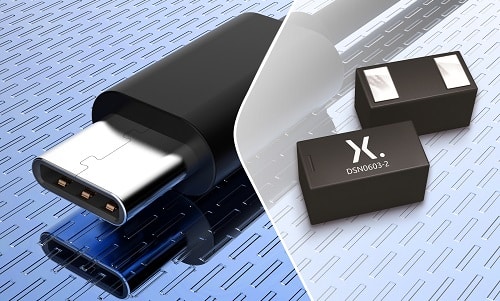Nexperia recently announced the release of two Electrostatic Discharge (ESD) named PESD2V8Y1BSF and PESD4V0Y1BCSF. The two protection devices are optimized for use with retimers and redrivers on high-speed data lines. PESD2V8Y1BSF is capable of protecting USB4 (Thunderbolt) interfaces while PESD4V0Y1BCSF is capable of protecting the HDMI 2.1 interface in addition to the USB4. The RF performance of the TrEOS technology used by the devices remains stable over the full operating voltage range. Apart from USB4 and HDMI 2.1, both parts can also be used to protect PCIe and DisplayPort interfaces.

According to the company, these products use Nexperia’s TrEOS technology, which combines low clamping with low capacitance and high robustness. Furthermore, to increase the overall system-level ESD robustness and help compensate for the reduced inductance between protection and retimer, both the devices provide fast Transmission Line Pulse (vfTLF) peak clamping voltages, which are considerably lower than the USB4 protection solution without visible trigger voltage in the standard I(V) TLP curve.
The two ESD devices offer full RF performance up to the reverse standoff voltage as the capacitance in the modules does not increase with operating voltage. These devices have a low insertion loss (-0.29 dB @ 10 GHz) and return loss (-20.6 dB @ 10 GHz) to comply with budget loss recommendations for ESD. Unlike other devices, the PESD2V8Y1BSF and PESD4V0Y1BCSF can be placed immediately next to the connector of the device which they are protecting, therefore offering greater design flexibility than other ESD protection devices, this also helps in improving the protection of the AC coupling capacitance
“Nexperia enables design engineers to meet tight budgets on both insertion and return loss for high speed USB4 data lines by providing devices that minimize the impact of ESD protection on overall system budget,” says Stefan Seider, senior product manager at Nexperia. “These devices offer the optimum balance between optimizing system-level ESD robustness and RF performance.”






